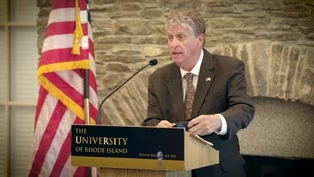
Another Path
Clip: Season 5 Episode 40 | 10m 19sVideo has Closed Captions
Career and Technical Education at area schools has exploded, and the results are dramatic.
Participation in Career and Technical Education at Rhode Island high schools has exploded, and the results speak for themselves, as students graduate at higher rates and score better on tests. Steph Machado dives into another path to a high school diploma.
Problems playing video? | Closed Captioning Feedback
Problems playing video? | Closed Captioning Feedback
Rhode Island PBS Weekly is a local public television program presented by Ocean State Media

Another Path
Clip: Season 5 Episode 40 | 10m 19sVideo has Closed Captions
Participation in Career and Technical Education at Rhode Island high schools has exploded, and the results speak for themselves, as students graduate at higher rates and score better on tests. Steph Machado dives into another path to a high school diploma.
Problems playing video? | Closed Captioning Feedback
How to Watch Rhode Island PBS Weekly
Rhode Island PBS Weekly is available to stream on pbs.org and the free PBS App, available on iPhone, Apple TV, Android TV, Android smartphones, Amazon Fire TV, Amazon Fire Tablet, Roku, Samsung Smart TV, and Vizio.
Providing Support for PBS.org
Learn Moreabout PBS online sponsorship(grinder whines) - [Steph] In between their regular math and English classes, these students at Cranston East High School take to the grinding wheel, beveling the edges of pipes so they can fit together to build a submarine.
- [Chris] Open and close.
If you wanna use two hands, you can, okay?
- [Steph] Across the room in this plumbing and pipe fitting class.
- Remember when you tighten those toilets up, don't crank on them.
- [Steph] There's a makeshift residential home where students learn to install a toilet and shower.
Luis Camacho is one of the students.
- If I was looking back when I was young, I would never expect this.
And I never knew I was gonna go into plumbing either.
Freshman year I would introduced to it.
First thing I like noticed was Mr. Richards.
I love the program since then.
- [Steph] Chris Richard is their teacher.
Once a special educator, he moved into the plumbing and pipe-fitting program and helped set up this state-of-the-art space in collaboration with Electric Boat.
- In the ocean, under water, at great pressures so you need to have everything welded.
- [Steph] Many of Richard's students are planning to go into the trades, but he argues it's a worthwhile class for everyone.
I even got a chance to learn how to use this ProPress to fit two pipes together.
- [Chris] And you're gonna squeeze the trigger.
That's it.
You're done.
- Cool.
- I just wanna expose them to it as well.
The skills they're gonna learn here, they're gonna be able to use the rest of their life.
Using a drill, using an impact driver, fixing a toilet, fixing a sink or whatever it may be.
You know, they're gonna have basic skills that they can, you know, they can fix things on their own.
We're in a very throwaway society, so "It doesn't work?
Throw it away," you know?
So it may be just they need to tighten something.
- [Steph] Across town at Cranston West High School.
- There's enough tanks for everyone to do salinity.
Check your pH level.
It should be around 8.4.
- [Steph] These students are learning aquaculture, the science of raising plants and animals in water.
- It is a crustacean with two mollusks living inside of the shell.
- [Steph] Their teacher, Leonard Baker, says many of his students go on to study marine biology in college and they bring with them eight URI college credits they got for free in high school.
- A lot of students don't know what they want to do and exposing them to different curriculum such as life sciences or even the welding and, you know, the plumbing program gives them an option.
- [Steph] These classes are just two of Cranston's 23 Career and Technical Education programs, hands-on training in high school that prepares students for a wide variety of careers, some that involve going on to college and others that don't.
- Over the past eight years, we've doubled our available programs.
- [Steph] Superintendent Jeannine Nota-Masse says, interest in Career and Tech Education, or CTE, is so high, nearly two thirds of Cranston's high school students are enrolled.
The district has to hold a lottery because there are more students signing up than seats available.
- We've really had to demystify the old way of thinking that if you go to Career and Tech Education, formerly known as voc school, that that would preclude you from going on to higher ed.
And in fact, we've had several of our valedictorians who have gone through our Career and Tech programming.
- [Steph] Cranston has had a Career and Tech Center on the West Campus for decades, but in recent years expanded so CTE is offered at both of the city's high schools.
- And I think this is a great time for them to be able to explore their strengths and weaknesses and their interests before they get to college and they're halfway through and they're a hundred thousand dollars in debt.
And then realize, "Oh, this isn't for me."
- [Steph] It's happening all over the state with programs now in every public school district other than Block Island.
And student participation has exploded.
There were roughly 9,000 students enrolled in CTE programs statewide in the 2017-2018 school year.
Just six years later, more than 20,000 students are participating.
- It's been a very dramatic change.
- [Steph] Bill Bryan is the chair of the Rhode Island CTE Board of Trustees, which was formed to help guide the state's CTE strategy, in particular, to respond to the actual needs of the workforce.
- Vocational education was really focused on specific technical skills.
Career and Technical Education is very different.
Career and Technical Education is intended to provide students a competitive advantage.
- So this is not what we used to call vo-tech.
- Not at all.
- [Steph] The results speak for themselves.
Career and Technical Education students graduate at a higher rate than their peers according to the most recent state data, with 92% of CTE concentrators graduating in four years, compared to an 84% graduation rate among all students statewide.
Test scores for CTE students are also a few percentage points higher than the statewide numbers.
And why do you think that is?
- Because I think they're spending a lot of their time on things that are active learning and hands-on.
And for the student who doesn't want to sit in a class and participate in a lecture about Chaucer or Shakespeare, they can kind of get through a class knowing that in the next class they will be building something with their hands or working with the fish in aquaculture or working on a 3D printer or a robot.
- It gives 'em a reason to come to school.
- It certainly does.
- [Steph] If there's a downside when it comes to CTE, it's the price tag.
Many programs require large facilities, expensive equipment, and teachers with specialized skills.
This three-pond system in Cranston's aquaculture class alone costs $23,000.
- Ponds break, heaters break, a lot of the equipment is consumable.
The fish food has to be repurchased.
It's not like buying a set of textbook that can last 10 years.
- [Steph] But Baker argues it's well worth it for students to put into practice what high schoolers used to only learn from textbooks.
- When I was learning science in high school, it was turn the page and look at our biology book.
We're still learning the same concepts, but they have to apply it right away.
So they do have a classroom where I give them notes, they learn the anatomy, physiology, and then I'm like, "Well, let's go take this knowledge and let's apply it."
And the true test of whether you understand it is, can you keep the fish alive?
- [Steph] Cranston gets much of its funding for CTE from other public school districts, about $2 million this year.
That's because state law lets students apply to other public school districts' CTE programs, and the money follows the student.
- Unless your homeschool has exactly the same program as the neighboring district, you can go to pretty much any CTE program.
If you live in Cranston and something intrigues you in Westerly and we don't have exactly the same program, you can go to Westerly.
- [Steph] On the flip side, it means school districts without a lot of CTE programs lose out on millions of dollars in tuition sending their students across town lines.
- Sometimes students want to go to another community for a variety of reasons, and we needed to manage this because it really becomes economics for a community if their kids are leaving and they have to take their public education dollars and send them to another community to follow the kid.
- If the industries are lobbying for this and it's benefiting them because they're getting workers, should they be contributing to the funding?
- The answer is "yes."
But the answer is "how?".
Part of the challenge is that education is local choice.
You can't tell a school district what to do, and we don't have a mechanism today to incentivize them to do what's best for the future economic benefit of the state.
- While CTE programs were multiplying over the last seven years, state leaders on Smith Hill were level funding the program.
Until this year when the General Assembly approved an additional $2 million for schools to open new CTE programs that don't exist yet in Rhode Island.
Is Rhode Island doing enough?
- We can do more.
I wish we did more because I think that would help our attendance in high school.
I think if students were able to participate in programs that truly interested them and they saw it as valuable beyond high school, I think that would help our attendance, engagement, students really being happy in school.
- [Steph] That's certainly true for Luis who spent his summer training at Electric Boat before coming back to school for his senior year.
- I look forward more to coming to school now.
You know, now I got something working towards, oh, I know I'm gonna do this for a living, so I gotta put my effort into school in general.
Get good grades, come in.
- High school is really changing.
Video has Closed Captions
Clip: S5 Ep40 | 6m 46s | Scrimshaw artist Brian Kiracofe on the art of engraving on ivory and bone. (6m 46s)
Video has Closed Captions
Clip: S5 Ep40 | 5m 3s | Governor Dan McKee’s approval rating remains low among voters, according to a poll. (5m 3s)
Providing Support for PBS.org
Learn Moreabout PBS online sponsorship
- News and Public Affairs

Top journalists deliver compelling original analysis of the hour's headlines.

- News and Public Affairs

FRONTLINE is investigative journalism that questions, explains and changes our world.












Support for PBS provided by:
Rhode Island PBS Weekly is a local public television program presented by Ocean State Media

